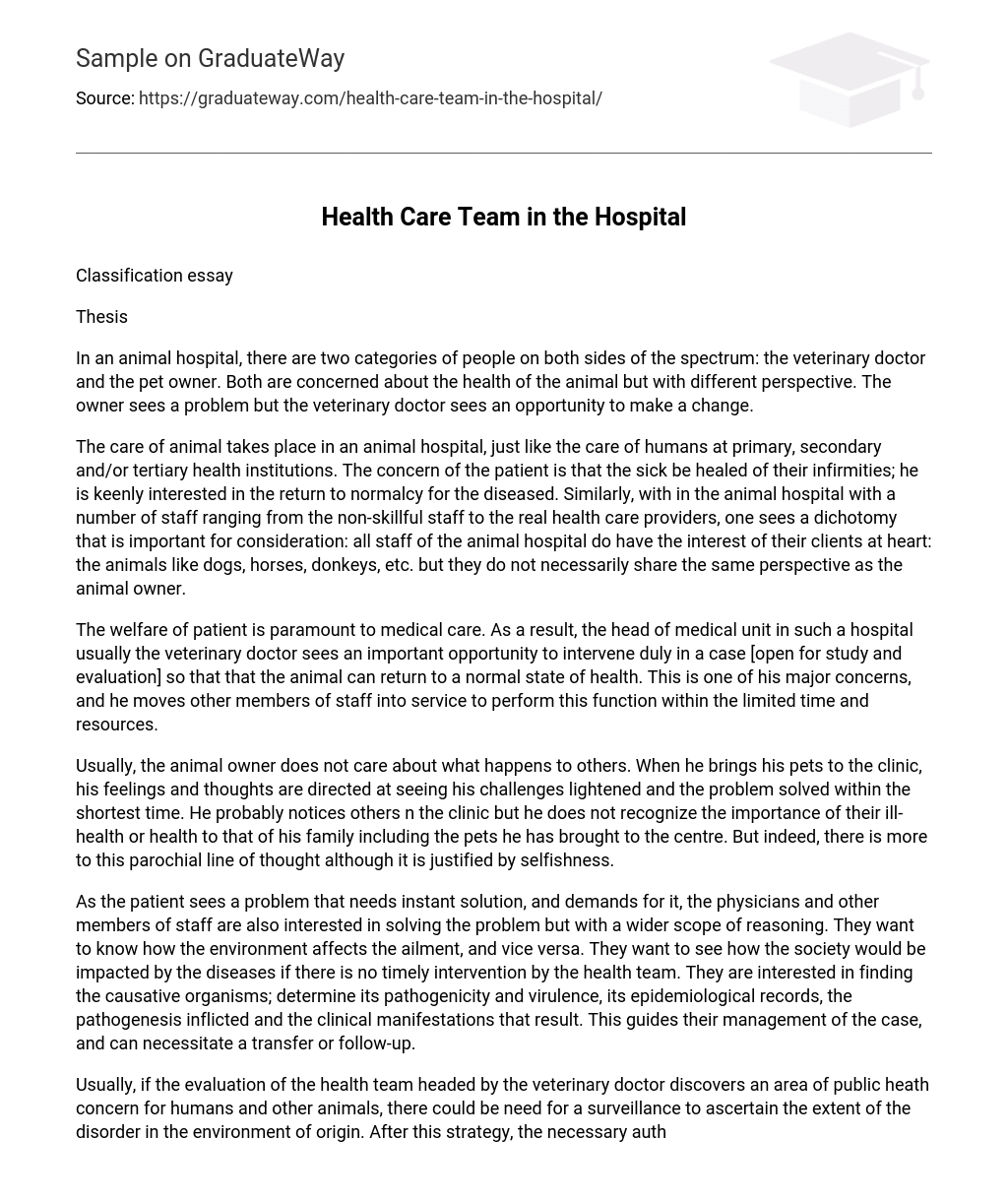Classification essay
Thesis
In an animal hospital, there are two categories of people on both sides of the spectrum: the veterinary doctor and the pet owner. Both are concerned about the health of the animal but with different perspective. The owner sees a problem but the veterinary doctor sees an opportunity to make a change.
The care of animal takes place in an animal hospital, just like the care of humans at primary, secondary and/or tertiary health institutions. The concern of the patient is that the sick be healed of their infirmities; he is keenly interested in the return to normalcy for the diseased. Similarly, with in the animal hospital with a number of staff ranging from the non-skillful staff to the real health care providers, one sees a dichotomy that is important for consideration: all staff of the animal hospital do have the interest of their clients at heart: the animals like dogs, horses, donkeys, etc. but they do not necessarily share the same perspective as the animal owner.
The welfare of patient is paramount to medical care. As a result, the head of medical unit in such a hospital usually the veterinary doctor sees an important opportunity to intervene duly in a case [open for study and evaluation] so that that the animal can return to a normal state of health. This is one of his major concerns, and he moves other members of staff into service to perform this function within the limited time and resources.
Usually, the animal owner does not care about what happens to others. When he brings his pets to the clinic, his feelings and thoughts are directed at seeing his challenges lightened and the problem solved within the shortest time. He probably notices others n the clinic but he does not recognize the importance of their ill-health or health to that of his family including the pets he has brought to the centre. But indeed, there is more to this parochial line of thought although it is justified by selfishness.
As the patient sees a problem that needs instant solution, and demands for it, the physicians and other members of staff are also interested in solving the problem but with a wider scope of reasoning. They want to know how the environment affects the ailment, and vice versa. They want to see how the society would be impacted by the diseases if there is no timely intervention by the health team. They are interested in finding the causative organisms; determine its pathogenicity and virulence, its epidemiological records, the pathogenesis inflicted and the clinical manifestations that result. This guides their management of the case, and can necessitate a transfer or follow-up.
Usually, if the evaluation of the health team headed by the veterinary doctor discovers an area of public heath concern for humans and other animals, there could be need for a surveillance to ascertain the extent of the disorder in the environment of origin. After this strategy, the necessary authority at local, state and national levels are alerted for prompt interventions so that the society can be saved from a possible diseases outbreak. Such outbreaks may not affect just other animals but can be zoophilic affecting humans by direct or indirect contact, and thus spread to other humans. In any case, the economy of the community affected is seriously ‘lynched’ and there is low productivity. This further confirms the need for the physician’s broader view because of his knowledge and experience.
It is not enough to just see a case in the hospital outpatient or on admission and leave it like that. The patient may do that with the fear that e may loose his dearly beloved organism to dreadful disease he knows little or nothing about. Usually he would have tried his efforts to resuscitate the pet but when the situation becomes overwhelming, he finds a way to the hospital. He patiently narrates his story to the physician on duty, laden with much emotion. The physician listens carefully, not moved by the rhetorics and sentiments represented in the history produced by the client but looks out or areas of concern that would be useful to help the pet, and invariably the owner. He may not be so much worried about the cost of management but he is interested in bringing succor to the pet owner assuring him of safe service. His fear is dissolved by the outcome of treatment, and returns home happy.
Indeed, the health care team in the hospital is more concerned about the present disease of the animal and instant management although this is the concern of the patient. He is also in other facts and factors intrinsic and extrinsic to the diseases that are of use to thee health sector and the community.
REFERENCES
Adetokunbo, etal. Short Textbook of Tropical Health
www.aahanet.org/
www.animalhospitals-usa.com





